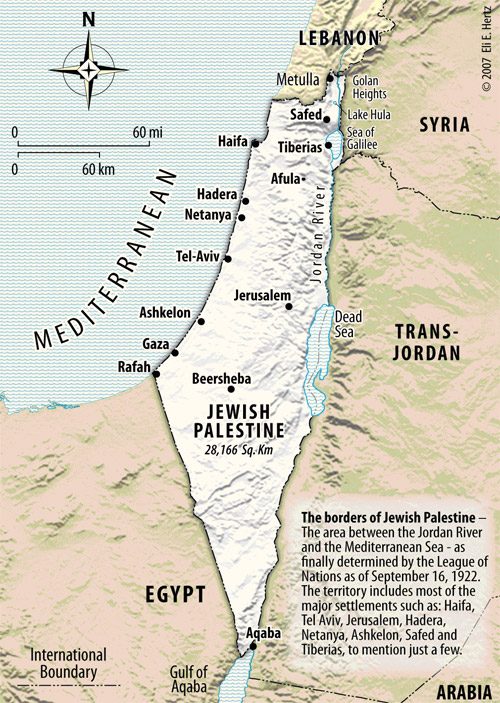 The “Mandate for Palestine,” an historical League of Nations document, laid down the Jewish legal right to settle anywhere in western Palestine, the area between the Jordan River and the Mediterranean Sea, an entitlement unaltered in international law and protected to this day by Article 80 of the UN Charter, that laid down the Jewish right of settlement in the whole of western Palestine, recognizes the continued validity of the rights granted to all states or people, or already existing international instruments including those adopted by the League of Nations [such as the “Mandate for Palestine”].
The “Mandate for Palestine,” an historical League of Nations document, laid down the Jewish legal right to settle anywhere in western Palestine, the area between the Jordan River and the Mediterranean Sea, an entitlement unaltered in international law and protected to this day by Article 80 of the UN Charter, that laid down the Jewish right of settlement in the whole of western Palestine, recognizes the continued validity of the rights granted to all states or people, or already existing international instruments including those adopted by the League of Nations [such as the “Mandate for Palestine”].
Eli E. Hertz – Myths and Facts
The Mandate unconditionally rejects Arab claims to national political rights in the land, in favor of the Jews self-determination and political development, in recognition of the historic connection of the Jewish people to the land of Israel.
Eleven successive British governments, Labor and Conservative, from David Lloyd George (1916-1922) through Clement Attlee (1945-1952) viewed themselves as duty-bound to fulfill the “Mandate for Palestine” placed in the hands of Great Britain by the League of Nations.
The British objectives in “mentoring” a national home for the Jewish People under the Mandate for Palestine rested on a solid consensus, expressed in a series of accords and declarations that reflected the “will” of the international community. The Mandate itself notes this intent when it cites that the Mandate is based on the agreement of “the Principal Allied Powers” and declares:
“Whereas recognition has therefore been given to the historical connection of the Jewish people with Palestine and to the grounds for reconstructing their national home in that country”
A June 1922 letter from the British Secretary of State for the Colonies, Winston Churchill, reiterated that:
“The [Balfour] Declaration of 1917 [was] re-affirmed by the Conference of the Principle Allied Powers at SanRemo and again in the Treaty of Sevres” “the Jewish people … are in Palestine as a right and not on sufferance. That is the reason why it necessary that the existence of a Jewish National Home in Palestine should be internationally guaranteed and that it should be formally recognized to rest upon ancient historical connection.”
In the first Report of the High Commissioner on the Administration of Palestine (1920-1925) presented to the British Secretary of State for the Colonies, published in April 1925, the most senior official of the Mandate, the High Commissioner for Palestine, underscored how international guarantees for the existence of a Jewish National Home in Palestine were achieved:
“The Balfour Declaration was endorsed at the time by several of the Allied Governments; it was reaffirmed by the Conference of the Principal Allied Powers at SanRemo in 1920; it was subsequently endorsed by unanimous resolutions of both Houses of the Congress of the United States; it was embodied in the Mandate for Palestine approved by the League of Nations in 1922; it was declared, in a formal statement of policy issued by the Colonial Secretary in the same year, “not to be susceptible of change;” and it has been the guiding principle in their direction of the affairs of Palestine of [then] four successive British Governments. The policy was fixed and internationally guaranteed.”
Lord Curzon, who was then the British Foreign Secretary, made this reading of the mandate explicit. “There remains simply the theory that the Arab inhabitants of the West Bank and the Gaza Strip have an inherent “natural law” claim to the area. Neither customary international law nor the United Nations Charter acknowledges that every group of people claiming to be a nation has the right to a state of its own.”
It is important to point out that political rights to self-determination as a polity for Arabs, were guaranteed by the same League of Nations in four other mandates—in Lebanon and Syria [The French Mandate], Iraq and later Trans-Jordan [The British Mandate].
Any attempt to negate the Jewish people’s right to Palestine—Eretz-Israel, and to deny them access and control in the area designated for the Jewish people by the League of Nations, is a violation of international law.
Eli E. Hertz – Myths and Facts








